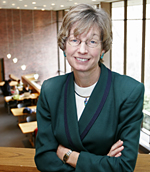IBS' Catherine Mann to moderate 'freewheeling' economic analysis April 1
Distinguished panelists include the chairman and CEO (retired) of Bank of America

Catherine Mann
On Wednesday, April 1, International Business School professor Catherine Mann will moderate a Rosenberg Institute of Global Finance panel to explore what additional short-term actions the U.S. should be taking to put businesses and employees back to work and to restore confidence. Panelists will include Martin Feldstein, President Emeritus of the National Bureau of Economic Research, Richard Rosenberg, Chairman and CEO (retired) of Bank of America, and Allen Sinai, Chief Global Economist and President of Decision Economics, Inc. The panel, which requires an RSVP, will start at 5 p.m. in the IBS’ Thomas H. Lee Lecture Hall. For more information about the event, visit the IBS Web site. Catherine Mann previewed the panel for BrandeisNOW:
Catherine Mann: The title of the forum is “Where do the US and Global Economies and Financial Markets Go From Here?” And we have a mix of people who are participating. Martin Feldstein is the outgoing president, the past president of the National Bureau of Economic Research. NBER is the institution that official institution that finds the calendar dates for when a recession has started. So when NBER “officially” dated the start of this recession as back in the end of 2007, it was really quite a dramatic commentary on the fact that all during 2008, people were sort of were saying, “Gee, many things aren’t going as well as we thought.” He has been a former head of the council of economic advisers and been involved in the research for a long time. So he’s a very important voice for both the practical issues related to recessions as well as policy. And he has his own views on what the most important policy issues going forward are in staving off continued decline and the price of housing.
We also have somebody who is a representative of the banking industry, Richard Rosenberg, who is the man for whom the Rosenberg Institute is named. He’s a chairman and retired CEO of Bank of America. And of course, Bank of America has been at the center of the implosion of the financial system. I think that some of the issues that he’s going to have to address are, what is it about too big to fail? These are very big institutions: Citibank, Bank of America, AIG. Is it a problem? Clearly it’s a problem when institutions are this big. We in policy circles, as well as in academics, thought that there were a lot of synergies that could be gained by bringing together large, different parts of the banking industry together under one roof – that’s why many of these institutions got so big. Of course, the downside of having such large institutions that have such wide responsibility for the expanding credit throughout the economy is that when these institutions go down or fail to function properly, their impact on the overall economy is just gargantuan. So he’s going to have to be answering the question of did the institution get too big? Did the fact that the institution got too big mean that nobody was minding the store? There were too many stores to mind, I suppose, would be one way of thinking about it. That’s kind of a backward-looking question for him, but a forward-looking question is going to be what is the nature of resolution? Are these programs and policies that are being put forward by the Treasury and the Federal Reserve to take the toxic assets off the balance sheets of the bank going to work? And what’s it going to take to get the big banks back into the business of what they do, which is to extend credit?
Our third panelist is Allen Sinai, who’s the chief global economist and president of Decision Economics. So he will be providing an outlook for the state of the economy going forward. We’re going to be asking him about how business assessment and unemployment and consumer behavior and all that kind of stuff affect the economy. Are some of the programs that are part of the Obama fiscal package going to bring consumers back into business in terms of what they do, which is to buy things? My guess is he’s also going to give us some views on the flow of credit. He’s going to give the view from the forecasting community of what is the likelihood of success of the Treasury and Federal Reserve set of programs? Does he believe these programs are going to effectively unlock the credit and securitization process that the banks and other financial institutions have not been doing?
The thing that I might add is that this is going to be a freewheeling discussion. These folks are coming in knowing that there will be no press here and people say different things when there is and when there isn't press. There’s going to be a frank discussion. My guess is I’m not going to have the same view on some of these things as they do and I’m not shy about giving my own opinion. So you might want to say there are four different views in the room, which means the audience is going to get some pretty interesting discussion. This is not going to be bland, it’s not going to be boring, it’s going to be pretty interesting.





